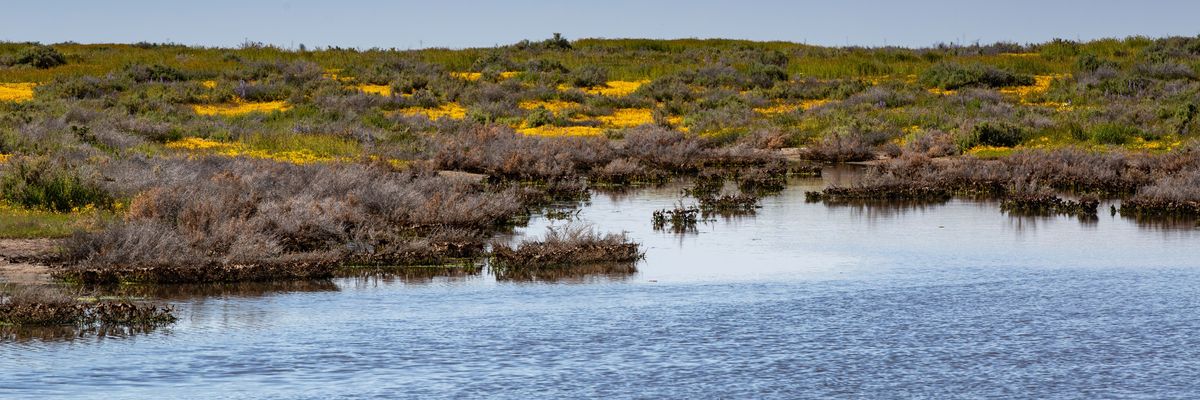
Environmental justice campaigners on Monday said the Trump administration’s latest rollback of wetland protections was “a gift to developers and polluters at the expense of communities” and demanded permanent protections for waterways.
“Clean water protections shouldn’t change with each administration,” said Betsy Southerland, former director of the Office of Science and Technology in the US Environmental Protection Agency’s (EPA) Office of Water. “Every family deserves the same right to safe water, no matter where they live or who’s in office.”
EPA Administrator Lee Zeldin proposed changes to the rule known as “Waters of the United States” (WOTUS), which has been the subject of debate and legal challenges in recent decades. Under the Trump administration, as in President Donald Trump’s first term, the EPA will focus on regulating permanent bodies of water like oceans, lakes, rivers, and streams.
The administration would more closely follow a 2023 Supreme Court decision, Sackett v. EPA, which the Natural Resources Defense Council (NRDC) found this year would remove federal protections from 60-95% of wetlands across the nation.
The Zeldin rule would eliminate protections for most wetlands without visible surface water, going even further than Sackett v. EPA in codifying a narrower definition of wetlands that should be protected, said the Environmental Protection Network (EPN). The rule comes after pressure from industry groups that have bristled over past requirements to protect all waterways.
Wetlands provide critical wildlife habitats, replenish groundwater, control flooding, and protect clean water by filtering pollution.
The Biden administration required the Clean Water Act to protect “traditional navigable waters, the territorial seas, interstate waters, as well as upstream water resources that significantly affect those waters," but was constrained by the Sackett ruling in 2023.
“This proposed rule is unnecessary and damaging, and ignores the scientific reality of what is happening to our nation’s water supply."
Tarah Heinzen, legal director for Food and Water Watch, said the new rule “weakens the bedrock Clean Water Act, making it easier to fill, drain, and pollute sensitive waterways from coast to coast.”
“Clean water is under attack in America, as polluting profiteers plunder our waters—Trump’s EPA is openly aiding and abetting this destruction," said Heinzen. “This rule flies in the face of science and commonsense. Eliminating protections from small streams and wetlands will mean more pollution downstream—in our drinking water, at our beaches, and in our rivers."
The “critical functions” of wetlands, she added, “will only become more important as worsening climate change makes extreme weather more frequent. EPA must reverse course.”
Leda Huta, vice president of government relations for American Rivers, added that the change to WOTUS will “likely make things worse for flood-prone communities and industries dependent on clean, reliable water.”
“This proposed rule is unnecessary and damaging, and ignores the scientific reality of what is happening to our nation’s water supply,” said Huta. "The EPA is taking a big swipe at the Clean Water Act, our greatest tool for ensuring clean water nationwide.”
The proposal was applauded by the National Association of Manufacturers, whose president, Jay Timmins, said companies’ “ability to invest and build across the country” has been “undermined” by the Obama and Biden administration’s broader interpretation of WOTUS.
But Southerland said Zeldin’s proposal “ignores decades of science showing that wetlands and intermittent streams are essential to maintaining the health of our rivers, lakes, and drinking water supplies.”
“This is one of the most significant setbacks to clean water protections in half a century,” she said. "It’s a direct assault on the clean water Americans rely on.”
Drew Caputo, vice president of litigation for lands, wildlife, and oceans at Earthjustice, said the group was evaluating the legality of the proposal and would "not hesitate to go to court to protect the cherished rivers, lakes, streams, and wetlands that all Americans need and depend on.”
“The proposal avoids specifying the exact scale of the deregulation it proposes, but it clearly would result in a serious reduction in legal protections for waters across the United States,” said Caputo. “Many waters that have been protected by the Clean Water Act for over 50 years would lose those protections under this proposal.”
From Common Dreams via This RSS Feed.

